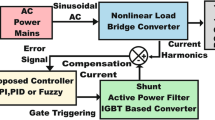Abstract
Harmonics generated by the nonlinear loads and unbalancing of loads are serious concerns regarding the power quality of the distribution system. An Enhanced technique to scale down current harmonics, balance loads by MSALC (Modified Shunt Active Line Conditioner) using traditional PI and enhanced FoPID (Fractional order PID) control device is presented in the article. Performance of MSALC using traditional PI and enhanced FoPID is tested for various load conditions and dynamic load changing characteristics were performed. Using MATLAB/Sim software the outcomes are verified. Comparatively harmonic current reduction between traditional PI and enhanced FoPID was discussed. Enhanced FoPID control device-based MSALC found to have superior performance than the traditional PI-based MSALC.






























Similar content being viewed by others
References
Gopalakrishnan M, Mohanty NK (2017) Fundamental sequence component based hysteresis current controlled MSALC. Energy Proc 117:1093–1100
Gopalakrishnan M, Mohanty NK (2018) Modified shunt active line conditioner (MSALC) using enhanced self-restoring technique with step size error elimination algorithm. Adv Intell Syst Comput 846:237–259
Gopalakrishnan M, Mohanty NK (2019) Performance analysis of modified shunt active line conditioner (MSALC) using Kalman filter trained by neural network. J Adv Res Dyn Control Syst 11(2):689–698
Gopalakrishnan M, Mohanty NK (2019) Performance analysis of modified shunt active line conditioner (MSALC) using notch adaptive filter. Int J Innov Technol Explor Eng (IJITEE) 8(7):1863–1873
Chaoui A et al (2007) PI controlled three-phase shunt active power filter for quality improvement. Electr Power Compon Syst 35(12):1331–1344
Jun-Yi C, Bing-Gang C (2006) Design of fractional order controller based on particle swarm optimization. Int J Control Autom Syst 4(6):775–781
Meng L and Xue D (2009) Design of an optimal fractional-order PID controller using multi-objective GA optimization. In: Chinese control and decision conference pp, 3849–3863
Kundu D et al. (2009) Designing fractional-order PID controller using a modified invasive weed optimization algorithm. World congress nat bio-inspired computing, pp. 1315–1320
Podlubny I (1999) Fractional-order system and PIaDb-controller. IEEE Trans Autom Control 44(1):208–214
Jun-Yi C et al. (2005) Optimization of fractional ordered PID controllers based on genetic algorithms. In: Proceedings of the fourth international conference on machine learning and cybernetics, pp. 5686–5689
Xue D et al. (2006) Fractional order PID control of a DC-motor with elastic shaft: a case study. In: Proceedings of the 2006 American control conference, Minneapolis, Minnesota, USA, pp. 3182–3187
Kashani HN, Rafiei SMR (2014) Optimal control of active power filters using fractional order controllers based on NSGA-II optimization method. Electr Power Energy Syst 68:1008–1014
Acknowledgements
We wish to thank everyone who has supported us along the way. We are grateful to our family members and friends who are all provided us ethical support.
Author information
Authors and Affiliations
Corresponding author
Additional information
Publisher's Note
Springer Nature remains neutral with regard to jurisdictional claims in published maps and institutional affiliations.
Rights and permissions
About this article
Cite this article
Muralikrishnan, G., Mohanty, N. Harmonic Current Reduction Analysis of Traditional PI and Enhanced FoPID Controller-Based MSALC. J. Electr. Eng. Technol. 16, 1769–1777 (2021). https://doi.org/10.1007/s42835-021-00709-5
Received:
Revised:
Accepted:
Published:
Issue Date:
DOI: https://doi.org/10.1007/s42835-021-00709-5




